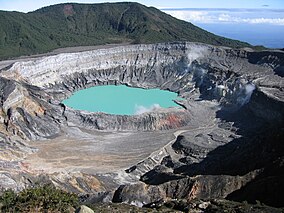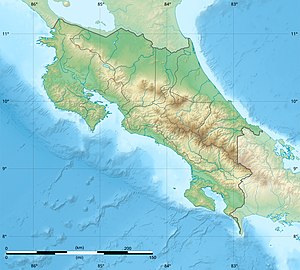Poás Volcano National Park (Spanish: Parque Nacional Volcán Poás) is a national park in Costa Rica that covers an area of approximately 65 square kilometres (16,000 acres); the summit of Poás Volcano located within the park is at an elevation of 2,700 metres (8,900 ft). The park was established on 25 January 1971. Depending on conditions, visitors can walk all the way to the edge of the main crater, but on 13 April 2017 the park was closed to visitors due to an explosive eruption on the evening of 12 April.[2] Still further eruptions, including on Easter, 16 April, caused the park to be closed until August 2018.[3][4]
| Poás Volcano National Park | |
|---|---|
 | |
 Poás Volcano National Park area | |
| Location | Alajuela Province, Costa Rica |
| Coordinates | 10°12′5.08″N 84°14′30.44″W / 10.2014111°N 84.2417889°W[1] |
| Area | 65 square kilometres (25 sq mi) |
| Established | 25 January 1971 |
| Governing body | National System of Conservation Areas (SINAC) |
| Website | https://www.sinac.go.cr/EN-US/ac/accvc/pnvp |
Location in Costa Rica | |
Over the years, the park has been frequently closed to visitors due to precautions because of water vapor and sulfuric acid gas emissions.[5] The status of the park being subject to change, potential visitors should check the current conditions at the park. Poas Volcano erupted twice briefly in September 2019.[6]
The volcano is located in the Central Conservation Area located in the Alajuela Province near the Pacific coast of Costa Rica, which encompasses the area around the Poás Volcano. The main crater is 290 metres (950 ft) wide and is quite active with frequent small geyser and lava eruptions, however the last major eruptions were during 1952–54. Two more craters make up parts of the park, the extinct Von Frantzuis crater and the Botos crater. Lake Botos is a beautiful cold, green water crater lake with a diameter of 370 metres (1,200 ft). The Botos crater has not erupted for about 7,500 years. Well-marked trails lead to the two inactive craters, conditions permitting.
Flora and fauna
editThe park maintains a variety of wild plant and animal species, such as the Poas magnolia bird species, including the clay-colored robin, black guan, resplendent quetzal and varieties of hummingbirds, tanagers, flycatchers and toucans. Mammals within the park include coyotes, rabbits, and marmots.[7]
See also
editReferences
edit- ^ "Volcán Poás - Protected Planet". Protectedplanet.net. Retrieved 8 July 2017.
- ^ "New Eruption at Poas Volcano in Costa Rica Forces Evacuation of Residents as Preventive Measure - Costa Rica Star News". News.co.cr. 12 April 2017. Retrieved 8 July 2017.
- ^ "Poas Volcano National Park in Costa Rica will Remain Closed due to Continuous Eruptions - Costa Rica Star News". News.co.cr. 16 April 2017. Retrieved 8 July 2017.
- ^ "Poás Volcano National Park".
- ^ Arguedas C., Carlos (23 September 2019). "Cierran de manera temporal el ingreso al volcán Poás luego de fuerte erupción de vapor". Retrieved 30 September 2019.
- ^ "Poás Volcano erupts again, sends ash cloud 2 km into atmosphere". 30 September 2019.
- ^ "Poas Volcano National Park, Costa Rica - profile and photos". Anywherecostarica.com. Retrieved 8 July 2017.
